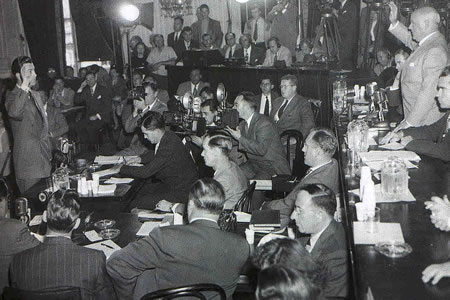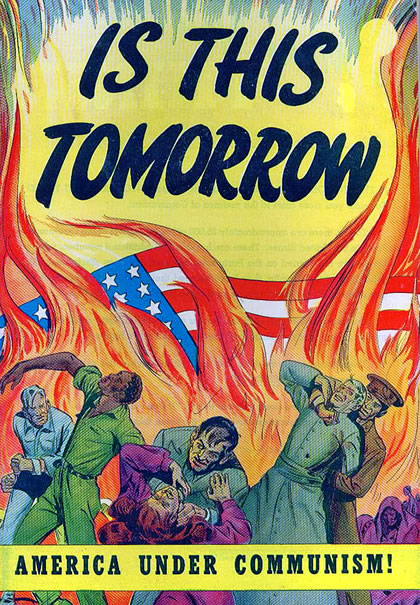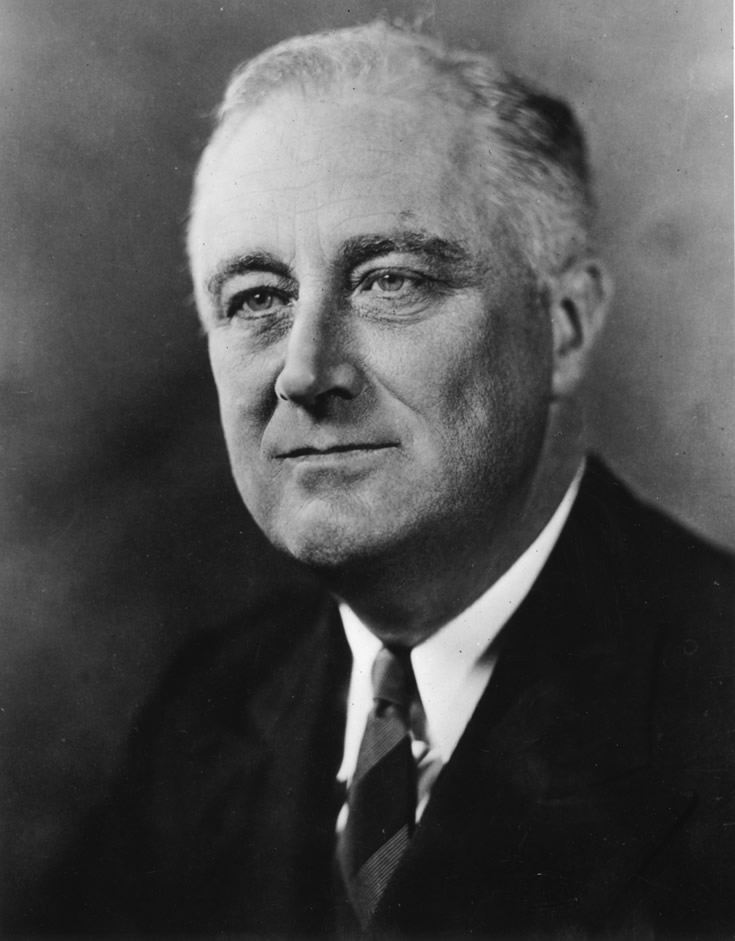 |
| House Un-American Activities Committee |
The House Special Committee to Investigate Un-American Activities was established inward May 1938 when the House of Representatives voted 191 to 41 to authorize an eight-month investigation into “the extent, character, too objects of un-American propaganda activities inward the United States.” The House would vote yearly extensions of the committee’s mandate through 1944. When the commission chairman, Texas Democrat Martin Dies, retired at the terminate of that year, its termination appeared likely.
But when Congress convened inward 1945, Mississippi Democrat John E. Rankin successfully pushed through a vote to brand the committee, renamed the House Un-American Activities Committee (HUAC), into a permanent standing committee. With its ever-escalating investigation of suspected Communists, this commission at times seemed to plough conspiracy fears into a national policy.
The moving forcefulness behind the adoption of the 1938 resolution was a Jewish lawmaker from New York, Samuel Dickstein, whose master copy target was pro-Nazi groups too propaganda. By 1940, however, the HUAC’s focus became Communist activities.
Standard accounts bill Dies of exploiting the HUAC to tar the New Deal too liberals every bit subversives. But at to the lowest degree every bit responsible was the Nazi-Soviet pact of August 1939 too the resulting shift inward the political party line that made the U.S. Communist Party (CPUSA) the spearhead inward resisting U.S. preparedness.
Hitler’s invasion of the Soviet Union too the accompanying reversal of the CPUSA line followed past times the wartime U.S.-Soviet alliance led the HUAC to proceed a depression profile. Two changes were responsible for its resurgence. One was the heating upward of the mutual frigidness state of war too the minute was the Republican capture of the House inward the 1946 elections, amongst the outcome that New Bailiwick of Jersey Republican J. Parnell Thomas became the novel HUAC chair.
In Oct 1947, the Thomas Committee won paper headlines amongst an investigation of Communist infiltration into the Hollywood moving painting industry. The high dot was the questioning of 10 writers too directors near their membership inward subversive organizations.
On guild from the Communist Party, the so-called Hollywood Ten refused to answer on First Amendment grounds too were convicted too imprisoned for contempt of Congress. In response, the moving painting manufacture adopted a “blacklist” of suspected Communist sympathizers— amongst many of the names on the listing supplied past times the HUAC too its staff. The moving painting industry’s model was followed inward other fields such every bit radio too television.
The high dot of the HUAC’s success too influence came inward 1948 from its hearings into Communist infiltration into the U.S. government. Its prize witness was Elizabeth Bentley, the onetime lover too accomplice of Soviet agent Jacob Golos.
Persons named past times Bentley every bit supplying hole-and-corner data included the high-ranking Treasury Department official Harry Dexter White, onetime presidential economical adviser Lauchlin Currie, William Remington of the War Production Board, too Maurice Halperin of the Office of Strategic Services. Although hopes of profiting from the publicity led Bentley to embellish the truth at times, the meat of her account—despite accusations to the reverse hence too since—was accurate.
Bentley’s testimony earlier the HUAC did non add together to what she had previously told the Federal Bureau of Investigation. More of an HUAC coup grew out of the follow-up testimony of Time journal editor Whittaker Chambers. Among those Chambers named every bit members of a hole-and-corner Communist tube inward Washington was Alger Hiss, a onetime high official inward the State Department too hence president of the Carnegie Endowment of International Peace.
Materials turned over past times Igor Gouzenko when he had defected from the Soviet diplomatic mission inward Canada had unmistakenly pointed to Hiss every bit a Soviet spy, too he had been quietly eased out of authorities service. But the HUAC did non ask maintain this data too Hiss set on such a slick functioning when testifying that the HUAC would ask maintain dropped the affair if non for Republican congressman Richard M. Nixon of California.
Nixon would live vindicated when Chambers, inward answer to a libel adapt past times Hiss, revealed photocopies of hole-and-corner authorities documents given him past times Hiss for transmission to the Soviets. Hiss could non live prosecuted for espionage because of the statute of limitations, but he was indicted for too convicted of perjury.
In 1948, Nixon joined amongst immature human HUAC fellow member Karl Mundt, Republican from South Dakota, to innovate what became the Internal Security Act of 1950, requiring “Communist-action” too “Communist-front” organizations to register.
The Democratic recapture of command of the House inward 1948 meant that Thomas was out every bit HUAC chair, too inward 1952 would live forced to resign from Congress later conviction for payroll padding. His successors—except for Pennsylvania Democrat Francis E. Walter, chair 1955–1963—were non formidable personalities.
From the start, the HUAC had its faults. Some of its leading figures—such every bit Thomas too Rankin— were non exactly anticommunists but racists too antisemites. The commission was prone to making sweeping generalizations on insufficient evidence.
Not all its informants had the firsthand cognition of Communist activities that Bentley or onetime Daily Worker editor Louis Bundez did too fifty-fifty they savage into the trap of exaggerating to heighten their self-importance, patch others were exactly frauds.
Inevitably, mistakes occurred when individuals were wrongly named every bit Communists or Communist sympathizers. The continuing line per unit of measurement area to retain paper headlines—a line per unit of measurement area heightened past times the successes along that line past times Wisconsin Republican Senator Joseph McCarthy—aggravated those failings.
On the other hand, those who refused to bear witness on the grounds of the Fifth Amendment’s guarantee against self-incrimination were condom from prosecution. Up through 1960, the Supreme Court rebuffed most legal challenges to the HUAC.
Those who wished to repent of past times interest were given ample chance to practice so. Those who took payoff of that opportunity—such every bit moving painting manager Elia Kazan—would live vilified past times the same people who were simultaneously accusing the HUAC of running roughshod over innocent individuals.
As for the complaints near guilt past times association, a person’s associates ask maintain ever been used every bit a guide to their evaluation. Most importantly, Communist infiltration of authorities too substitution opinioninfluencing institutions was no paranoid delusion but a unsafe reality.
The atomic number 82 inward attacking the HUAC came from Communists too immature human travelers who had pressing reasons for non wanting a unopen hold off at their activities. The laid on was joined past times many liberals. Some were motivated past times a sincere trouble concern near what they saw every bit a threat to civil liberties; others because they saw the HUAC every bit a weapon inward the hands of supporters of a competitor right-wing political agenda.
The HUAC retained stiff congressional back upward through the 1950s but the tide began to shift inward the 1960s. Influenza A virus subtype H5N1 vehement confrontation betwixt constabulary too protesters inward May 1960 when the HUAC held hearings inward San Francisco signaled a renewed too to a greater extent than aggressive drive against the HUAC past times supporters of the emerging New Left joined amongst the remnants of the Old Left too such longtime anti-HUAC organizations every bit the American Civil Liberties Union.
At the same time, the HUAC faced an increasingly hostile Supreme Court bulk led past times Chief Justice Earl Warren, patch the easing of mutual frigidness state of war tensions undercut pop support. To appease its critics, inward the mid-1960s the HUAC turned the focus of its attending on the Ku Klux Klan. In 1969 Democratic Congressman Richard I. Ichord of Missouri took the atomic number 82 inward reorganizing the HUAC into the House Internal Security Committee amongst a to a greater extent than narrowly defined mandate.
But these changes failed to satisfy the HUAC’s foes. The lastly blow was the Watergate scandal when HUAC opponents took payoff of Nixon’s disgrace to force through the committee’s termination inward Jan 1975.








